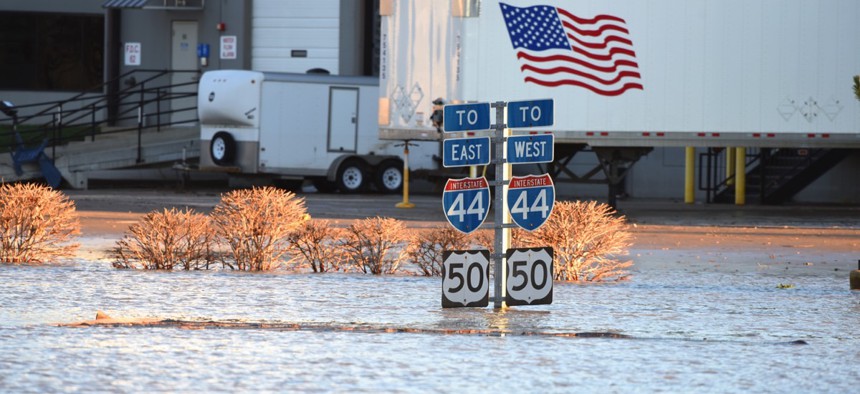Connecting state and local government leaders
Craig Fugate survived eight years managing FEMA through disasters. Here's how.
Leading the Federal Emergency Management Agency is a high-risk proposition. The agency’s administrator is always one failed emergency response away from opprobrium and dismissal.
So perhaps W. Craig Fugate’s most impressive accomplishment is simply surviving nearly eight years at the helm of FEMA. (He took charge of the agency in May 2009, after serving as Florida Gov. Jeb Bush’s emergency management director.) Along the way, he’s attracted attention for his Waffle House index of disaster recovery and for promoting the notion of whole-community response to incidents.
But what Fugate may be most proud of is what he has done in an area where many political appointees fall short: day-to-day management of his agency. As his tenure comes to a close and he plans a return to Florida, Fugate spoke to Government Executive about changes in FEMA’s policies, procedures and operations over the last seven and a half years. Below are excerpts from that interview.
On mission and management:
With sequestration, budget cuts and everything else, we had to make some decisions about our mission and what we were going to do, and so we’ve been focused, internally, on the things that don’t generally make a lot of noise, unless you don’t do it well. But when I got here, we were in nine different buildings with a real estate footprint all over the capital. We’re now down to two buildings—with no layoffs.
The thing that I’m really pleased about is I actually have a strategic plan that’s linked to my budget. My operations people understand what their role is. And the last thing was, we’ve gotten—which I found really surprising when I got here—every FEMA employee that we’ve hired in about the last six and a half years, to do something that’s pretty basic: Sign a statement saying they know they’re available 24 hours, seven days a week for employee support in disaster response.
On cutting official policy guidance:
We’ve cut our policy by about 90 percent. We had a policy for everything. We ended up consolidating, condensing and eliminating a lot of that to clean that stuff out.
The first thing I did, I said, “I want every policy we have that’s not tied to a classified activity put online.” I thought that was a pretty reasonable request. It turned out that it wasn’t, because there were so many policies. We had about as many policies as we did people and public business. And they were oftentimes outdated. They were duplicate. They’d never been rescinded.
And so we put our teams together and took all of the documents that were involving recovery activities and we condensed them down, eliminated most of them, and created one policy document. And it’s kind of fun because it still had a lot of content, but you now have one document and you can search and go, “Is pet food an allowable expense in a disaster?”
It really came back to my frustration when I was a state director. In the middle of an event, when you’re dealing with something, somebody comes to you with a policy and goes, “Where did this come from?” It was sitting in someone’s drawer. “Well, how would we have known about it?” So, it’s just making everything go online and telling people, “If it isn’t online, it doesn’t exist.” And oh, by the way, it’s going to have a sunset date. If you’re not renewing it, it’s going to die.
On managing FEMA’s workforce:
Well, when I got here I was told, “You really can’t fire people.” I proved that wrong. I was told, “You can’t move [Senior Executive Service members] around.” I proved them wrong on that. What I came across was, I had a lot of great folks who wanted to do their jobs but, in many cases weren’t allowed to or were told that wasn’t their job.
So I said, “Everybody who works at FEMA is an emergency manager.” And that means that if you are going to have an emergency job, that you have to be prepared to deploy to a disaster, or deploy to one of the operations centers internal to FEMA, or perform your daily functions to cover for the other staff members that are having to deploy under those other two conditions. But nobody gets to opt out of being part of the team during a large-scale response.
But then, that wasn’t enforceable because that wasn’t in their job descriptions. So, I changed that so for all new hires, it’s now in their job descriptions. And if you talk to anybody that works at FEMA that’s been hired in the last five or six years — we make it a big deal — when they come in and swear their oath, they have to do a signing statement that acknowledges that they are on call and available 24 hours a day, seven days a week for emergency activities.
We had no standard onboarding process when you got to FEMA. You just showed up and maybe in a couple of days you got an ID. Maybe a couple of days later you got a password. Then if you were lucky, somebody took the time to explain to you your travel. We now have a formal academy that all new hires—including executives—they go to for two weeks. And it’s everything from FEMA 101 to making sure they’re sworn in.
Every employee at FEMA is on a performance plan. And it’s not because we think we have bad employees, It’s because too often I’ve heard from employees, “I don’t know what’s expected of me and I don’t know how to know if I’m doing my job.” So we took the approach that we’re going to put all employees and all senior executives on performance plans. And this is to us is a contract between the employee and supervisor of what your plan is for the next year. Not only what the expectations of your supervisor are, but what are your training opportunities.
And then we hold both the employees and supervisors accountable on those performance plans. Again, this is like, to me, very basic stuff, but it wasn’t being done uniformly and in many cases it wasn’t being done at all.
We require now that all employees have a FEMA qualification because we don’t know when the next Sandy is going to occur, when the next Katrina is going to occur. And even most recently in Hurricane Matthew, we were active in five states in supporting disaster response. We deployed a lot of folks from headquarters. For them—for a lot of folks—that’s why they came to FEMA. It’s not just the day-to-day job that makes this place attractive to them, it’s that they can go help people in a crisis.
On FEMA’s readiness for a Katrina-scale disaster:
Well that’s like asking, “How many people can you deploy?” The answer is always going to be—it won’t just be FEMA, it’s going to be the whole of the federal government and all of our other partners. But as far as what we’re prepared for? Katrina ain’t that big compared to some of the things we’ve exercised. The Cascadia Subduction Zone, our major exercise last year, involved three states, a much larger deployment than we required for Katrina. And so what we’re doing is — we’re not exercising to what we’re capable of, we’re exercising to the scenarios that could occur.
And yeah [in the exercises], we’ve run out of people, we’ve run out of stuff, we’ve run out of a lot of things, because that’s the whole point. You have to exercise to what can happen, not what you’re capable of, and then look at where can you make up the deficits. So we also work as part of the Department of Homeland Security with a surge workforce—of tapping into other components within DHS that could deploy in support of the FEMA work that we do. This was done during Hurricane Sandy. We had folks from all of the various components at DHS serving in roles supporting FEMA directly in that response.
But I don’t want to give people the false sense that in a Katrina-size event or a Cascadia-size event that everything you want and everything you’re gonna need is going to get to your doorstep quickly. Because that’s not a reality, either. And that’s one of the reasons why we keep going back to preparedness and tell people the fastest response in these catastrophic disasters is neighbor helping neighbor.
To a certain degree, I caution people that hurricanes are relatively different than no-notice events in that you can plan, move and coordinate a lot a capability prior to landfall. The real test I want FEMA focused on is scenarios that give no advance warning, that would result in catastrophic impacts and require us to begin responding with little or no assessments. And those are earthquakes.
On whether he would stay on in the Trump administration if asked:
Nah, it’s time to go home. In any organization, over a period of time, you get to the point where you’re executing what you’ve been doing, and you’re refining it. But organizations constantly—particularly organizations like FEMA—they need new blood. They need new thinking. They need new leadership. Seven years, eight months—I think it’s time for a new infusion.
Before the election, I already knew I was going home and had told people that I would not stay. But I’m proud of the fact that I think I’m leaving FEMA in better shape than I found it. This is a very strong team, here, with the career leadership in the Senior Executive Service. And I’m quite confident that serving an incoming administration, being able to execute the mission and do the day-to-day, is well in hand.
Dave Nyczepir is a News Editor at Government Executive’s Route Fifty and is based in Washington D.C.

NEXT STORY: Utah Gov.’s $50,000 Anti-Pornography Plan; Iowa Faces $100 Million Shortfall




